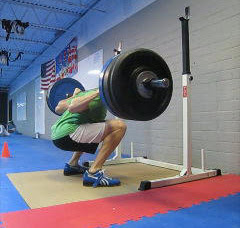Back in October of last year, Dr. Michael R. Eades wrote an interesting post about one way in which low-carb diets work by providing a metabolic advantage over any isocaloric diet of different macronutrient proporitions (ie. a high carb diet). Proponents of the "A Calorie is a Calorie" concept argue that suggesting such an advantage exists defies the laws of thermodynamics and therefore can not be true. The law that they are talking about is the 1st Law of Thermodynamics, or the Law of Conservation of Energy, which states:
"The increase in the internal energy of a system is equal to the amount of energy added by heating the system, minus the amount lost as a result of the work done by the system on its surroundings."
Simply stated, and in reference to the body and nutrition, energy can neither be created or destroyed, so Calories in (food) must = Calories out (metabolism, exercise, etc.). Unfortunately, the universe isn't that simple. Eades uses the 2nd Law of Thermodynamics to show this. This law, which states:
"The entropy of an isolated system not in equilibrium will tend to increase over time, approaching a maximum value at equilibrium."
What this means is that you can't turn 100kcal of pasta into 100kcal of activity, some of that 100kcal is lost as heat, which depends on what type of calorie it was (carb, protein, fat). This changes the Calories in = Calories out equation to Calories in = Calories out + Entropy (the energy lost to the universe, usually as heat, during any chemical reaction).
How all of this applies to weight loss and low-carb diets is that the entropy created in converting non-carbohydrate macronutrients (fat, protein) into blood sugar for energy is much greater than that created by carbohydrates into blood sugar (carbs = sugar). Fat and Protein doesn't convert to blood sugar easily. It takes many steps and many different chemical reactions, all of which result in a loss of heat to the universe. All of these extra steps means that your body has to expend more energy, and the lost heat results in a higher basal metabolic rate, which means that you burn more calories at rest. This result has been shown in the following study which Eades provided reference to.
The bottom line: if you take two people, put them on isocaloric diets, one that is low-carb, and one that is high-carb, the person on the low-carb diet should lose more weight because they are having to expend more energy to convert fat and protein to sugar.
Monday, February 18, 2008
Subscribe to:
Post Comments (Atom)


1 comment:
Hello. I like your blog - a lot of ideas similar to mine. I stumbled on it while looking up grain antinutrients.
With regards to this post, I think raw energy required to digest different types of nutrients is only a small part of the story behind why the simple calorie-counting model is wrong.
I think the main issue, which is only now becoming understood, is the hormonal effect of various foods on the system. Every time we eat, it is like inputing a program of hormonal instructions into the body's endocrine "computer system". These instructions vary depending on what type of nutrients are eaten, in what proportion, and in what form (i.e., level of processing). The instructions can amount to telling your body whether to store fat or burn it, store glycogen in muscles or the liver, etc...
A big category of hormonal instruction appears to be about even whether to use the calories present in the GI tract at all. This is something quite obvious ignored by calorie counters: eating a calorie doesn't mean you'll use it. (Diarrhea is an obvious example where calories are eaten and not used.)
A study you might want to look into: mice were fed identical calorie and macronutrient proportional diets except the type of fat included was varied. This resulted in massively different body composition results. The mice who ate fish oil ended up skinny, the one's who ate lard ended up significantly fatter, and the ones who ate vegetable oil ended up fatter still. The difference between the results of fish oil diet and the vegetable oil diet translated to the difference between a 150 pound man vs. a 225 pound man.
(Metabolism, Vol. 45, No. 12 (December), 1996: pp 1539-1546)
I found it referenced here: http://cbass.com/TRIGLYCE.HTM
Post a Comment